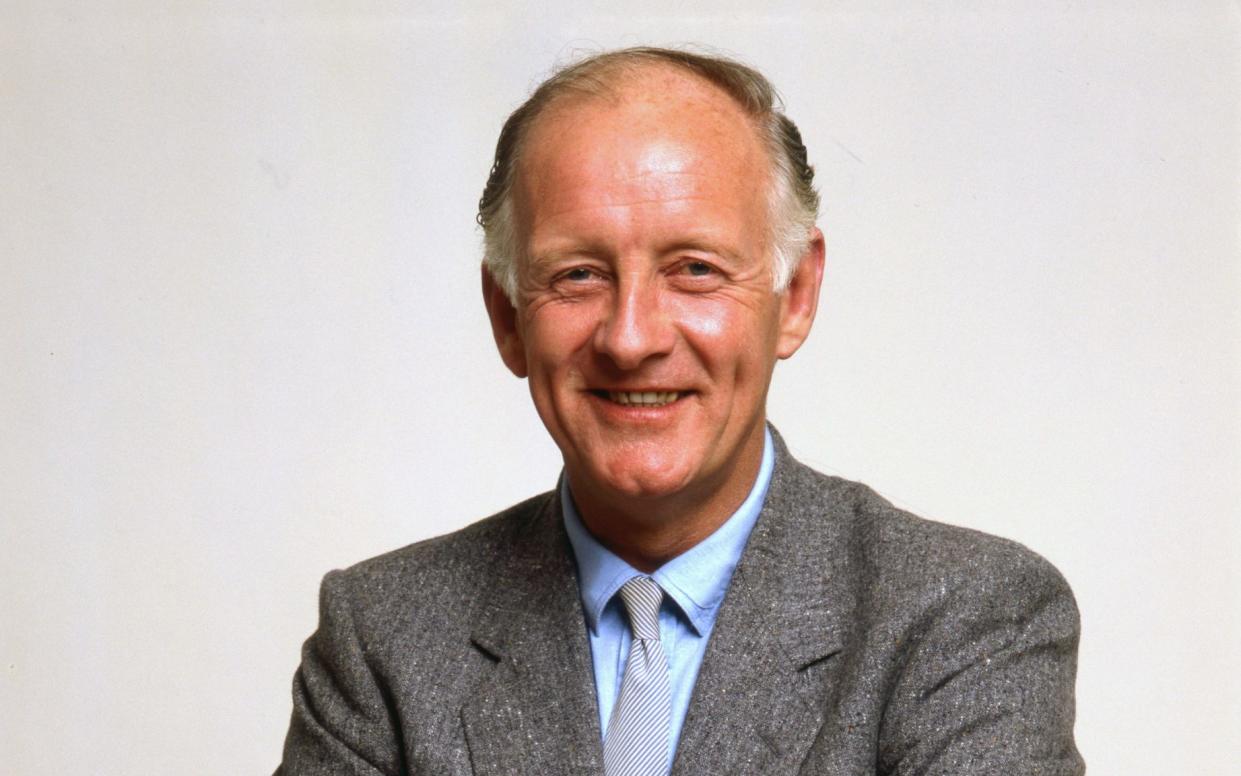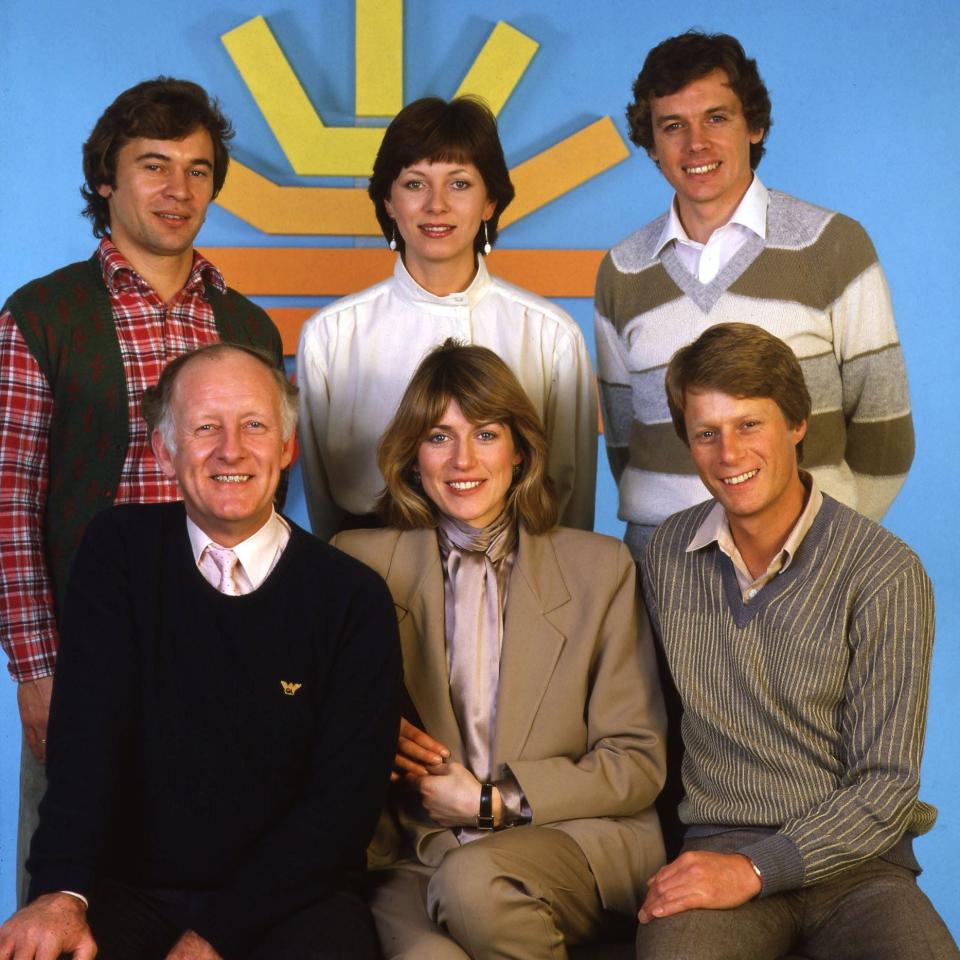The rise and very public fall of Frank Bough

Growing up in the Seventies and Eighties, presenter Frank Bough was as much part of the furniture in our suburban lounge as the unwieldy television taking pride of place with its vast teak-veneer casing.
Mondays to Fridays, he shared our early family evenings, unflappably fronting the news magazine programme Nationwide, before coming back on Saturdays for Grandstand. We were happy to invite him into our homes: a reassuringly familiar presence in his M&S cardies, just like my dad’s.
When he sent himself up by donning a sailor suit to dance to music from South Pacific for an audience of 21.3 million on the 1977 Morecambe and Wise Christmas Special, his place as the nation’s favourite uncle was secured. As if that wasn’t enough, from January 1983 we woke up with him, too, on the new-fangled Breakfast Time.

Then, overnight, everything changed. He had switched to presenting travel programme Holiday, with his physiotherapist wife, Nesta, when in June 1988 a News of the World exposé caused him to disappear overnight from our lives. It revealed that, in between all the time he was spending with us (and this, remember, was another broadcasting age, with just four TV channels to choose from, and him almost always on one of them), he had been frequenting brothels in Mayfair, taking drugs and wearing lingerie.
Bough’s world came crashing down: his reputed £200,000-a-year BBC salary was gone, and he was exposed as not exactly the clean-cut family man he had made out to be. And in some ways our world was turned upside down, too. Yes, of course, we were now adult enough to know that not everyone on TV was blameless, that Freddie Starr ‘ate’ hamsters (and nonsense news was now served as entertainment), but I do recall a sense that, if middle England couldn’t rely on Frank Bough, then who else was there?

In the abridged version of his rise and fall that has been shaped by the 30 years since he was so publicly shamed, Bough was never allowed to darken our doors again. Why would we let a man like that back into our front rooms? But he did try. Less than a year later, he was back, but only on Sky (then with fledgling audiences) and fronting regional news shows until, in 1992, he made the news again, this time leaving the scene of sadomasochistic orgies.
He issued yet more apologies, and made a second attempt at rehabilitation on LBC. By then, however, ‘Bough-ing’ had become part of the language for sex, his double life had become a running gag in early seasons of Have I Got News For You, and the man himself retreated into obscurity in Berkshire.
The announcement of his death, at the age of 87, in a care home last week has caused many – mainly well-known men – to frame memories of him by skipping the later troubles and harking back to the cosy, likeable, celebrity-next-door of his TV heyday.
“I spent a lot of time in [the Boughs] home in my teens,” scriptwriter and author John O’Farrell has shared (he was best friends with the middle of their three sons). “He was about the most famous person on the telly back then, but in person he was completely unassuming and had time for everyone.”
Comedian Al Murray has wondered aloud if there was a miscarriage of justice all those years ago. “Would Frank Bough have been fired these days?” he asks. In an age where viewers and voters seem unconcerned by the private lives of those they watch on screen and elect as presidents and prime ministers, does it really matter, after all, what Frank Bough did off-camera?
As the man himself had pointed out at the time: in a 1992 interview broadcast on Sky, he tried to lay down some private-professional boundaries and salvage his reputation. “Everybody, when they have difficulty with their marriage or sexuality, surely has the right to sort out these things in the privacy of their own home.”
Nesta Bough – who stood by her man from their marriage in 1959 to the end – sat next to him in that interview. “Obviously I have thought, ‘do I stay or do I go?’ I mean I would not be honest if I said I hadn’t,” she said. “But we have been together for a long time. We have brought up a family… [I] do feel betrayed by it, but I do not feel that it is anything personal to do with me.”
Bough’s disgrace probably would have played out differently today. Modern puritans are more concerned with sexual consent than proclivities. And where Bough ended up ruined by tabloid prurience, Hugh Grant, himself hung out to dry after being caught in a compromising position with prostitute Divine Brown in a car on Sunset Boulevard in 1995, fought back and successfully refocused the public’s attention on the morality of the media.
Bough tried the same line of argument at the time, but it got little purchase. But it’s interesting to note that many prominent women in the media, who also had first-hand experience of Bough’s behaviour off-camera, have been conspicuous in their silence amid the early tributes paid to him. In her autobiography, Fern Britten recalls coming across Bough when she was a young hopeful in the TV world – recording how he came up to her and whispered in her ear: “Well, young lady, I wonder how long it will be before I am having an affair with you.” Bough also, Britten revealed, made crude, sexist remarks about his breakfast TV co-presenter, Selina Scott: “I bet she even rides a bike with her legs together.”
Broadcaster and author Shyama Perera co-hosted a breakfast show on LBC in 1995 with Bough. Despite his reputation by that stage, on their first morning of working together, she remembers: “He made a point of telling me he always showered before heading to the studio for 5am, adding ‘so my penis is clean’.” Though she grew to “half-like” him, she also had a sense, she says, that there was “an essential self” that diverged from the clean-cut image that had fuelled his rise on the BBC.
Another former female colleague, Sally Jones, who joined BBC Breakfast in 1986 as its first female sports presenter, offered a practical explanation. His cocaine habit, she suggested, may have been prompted by his “absolutely punishing” early morning schedule. And, if the BBC were about to start sacking people nowadays for using drugs, as Piers Morgan once pointed out in a Channel 4 documentary on the subject, “then I’m afraid you’d be left with Moira Stuart and that’s about it.”
Some TV ‘names’ caught out after Bough did find a way back. Angus Deayton, who made many of the jokes at his expense on Have I Got News For You, lost his own job after being exposed in 2002 for similar interests in prostitutes and cocaine, but has worked regularly since as an actor. Richard Bacon may have been forced to hand back his Blue Peter badge in 1988, after he was caught on film taking cocaine; however, his broadcasting career not only survived but flourished (he is now a producer in LA) as has another children’s TV presenter turned radio host, Jamie Theakston, who in 2002 was revealed by a newspaper to have had sex with three prostitutes in a Mayfair hotel.
In his long exile, Bough may have looked on enviously and thought, “If only I had been born later”. But that is to underestimate (with apologies to Deayton, Bacon and Theakston) just how big a part of national life Uncle Frank once was.


